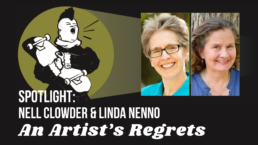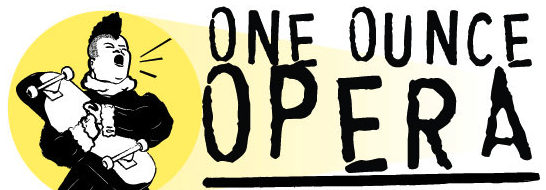Get to know Composer & Librettist Nell Clowder and Dramaturg Linda Nenno, creators of An Artist's Regrets, getting its world premiere with One Ounce Opera.

Often the most poignant and powerful dialogue happens between those who create and those who perform. That’s why OOO connects our singing-artists with the composers and librettists selected for the 6th Annual Fresh Squeezed Ounce of Opera.
So if you’re curious about the musical themes, story inspiration, what to listen for, and more, you’re in the right place.
Here, enjoy insights about An Artist’s Regrets, written by Nell Clowder & Linda Nenno, – with questions from the cast – sure to enhance your FSOO experience.
First a quick synopsis:
Immersed in a storm of contemplation and reflection, an Artist questions her chosen paths – and what she should’ve done instead – with the help of three unexpected yet all-too-familiar guests. How will what the guests offer affect the Artist’s interpretation of what has become their deepest regrets?
This opera plays with time travel in a sense, visiting yourself at different ages. If you had to choose only one: to go back and see your younger self, or travel forward and see your older self, what would you choose, and why?
Nell: That is a tough question. My past history holds no mystery and I wouldn't want to mess with my younger selves or confuse them. They did what they did, and they did the best they could. On the other hand, I'm not eager to see myself further aged. And whatever wisdom an older self would have for me: if I were ready for that, wouldn't it be coming to me on its own, anyhow? There are so many sources of wisdom in this world, once you open to it coming from unexpected places. In thinking about the ending, Linda posed the question, "What is the opposite of regret?" I think one opposite of regret is focusing in the present, living your life now and letting go of the past (and future). So if you give me a time travel ticket, I'm not using it to go to Nell Land.
Linda: Goodness, that question scares me a little. It is seductive to think that I could go back and relive an earlier part of my life when I thought I was happy and healthy and whole but I think I am happier and healthier and more whole in my life right now than I have ever been. Who knows what the future holds?
How did you decide to assign the ranges for the different ages represented? Was the impetus for writing this opera/libretto autobiographical in nature? If so, was the process of writing this opera/libretto therapeutic?
Nell: They say about writing that you should "write what you know." On the other hand, being too close to your subject matter, making it too personal, can cause problems. It was serendipity that the subject matter of "An Artist's Regrets" was something Linda had been thinking about, but not so much for me. The inspiration for the opera came from Linda's experience, but by the time I twisted it this way and that for dramatic and musical purposes, it was autobiographical only in a broad sense. We developed the scene with the youngest self first. Then followed the scene with a middle-aged character, and the goal there was to create a strong contrast, to not repeat the emotional dynamic of the first scene. The idea to introduce a senior self came later. The specific ages for the characters were chosen just to give a nice spread between them.
Linda: Since it started as my story, the ages we picked were linked up to significant times in my life where there were issues that I was having some regrets about.
Is the character in your opera based on your life or someone you know, or just the general young artist?
Nell: The twenty-year old artist character represents aspects of both Linda and me as young adults. And, I suspect, of many other artists as well. We were caught up in our "thing" and the thing did not involve financial planning or thinking about the future.
Linda: Yes, it did start from my personal story but as Nell said, it evolved into our story and then hopefully it will resonate with everyone.
I love that the end of the opera is about not having regrets. Did you start out with that intention or did the piece evolve as you wrote it?
Nell: I hoped from the early stages that the story would end up with the protagonist relieved of her burden of guilt and regret. How to do that without being preachy or schmaltzy was a major concern. I felt that the audience would be bored if the pattern of interacting with a past self was repeated a third time, so the idea of flipping that – of having a future self come back to the protagonist – presented itself, and the way to finish the opera came clear. An older self offered a voice that could help the protagonist finish her journey toward self-forgiveness.
Linda: When Nell and I started this process I truly was having regrets about some choices that I did or did not make in my past. I would say I was struggling with a lot of self judgement that was really getting me nowhere. The collaboration with Nell helped me take it away from my personal struggle and into a more universal awareness that we all share as human beings, That led me to a very new perspective and now I wouldn't change a thing. Well, maybe I would have been a bit more financially responsible to myself, but now I do understand that I am right where I need to be.
photo credit for Nell: Mindy Best

